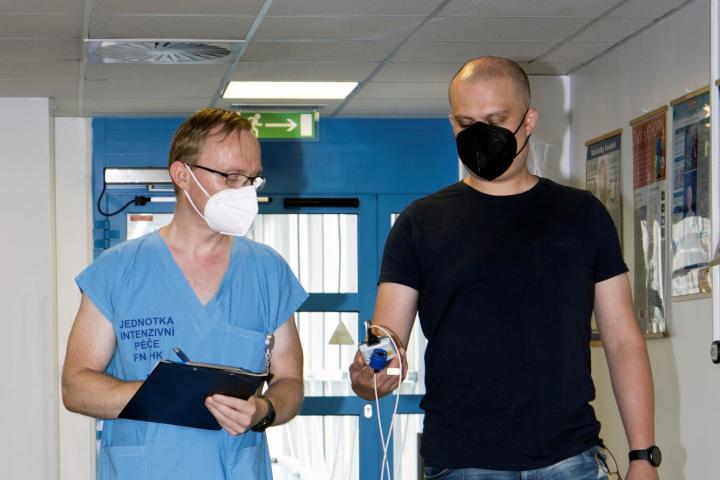
Experts from the Department of Physiotherapy at the Faculty of Physical Culture at Palacky University Olomouc, the Department of Military Medical Service Organisation and Management at the Faculty of Military Health Sciences at the University of Defence, the Department of Computer Science at the Faculty of Electrical Engineering at the CTU in Prague and the University Hospital Hradec Kralove are collaborating on the project. "It is great that specialists from across different disciplines will be involved in the project," says the Rector of CTU Assoc. Prof. Vojtech Petracek. "I believe that the system will help as many patients as possible and that it will shorten follow-up care and improve its quality."
"In many patients with a severe incidence of the disease, it is necessary to deal with the consequences of the infection in the so-called subacute phase, in the second and third months after the onset of the disease. Patients suffer from shortness of breath, fatigue, depression or insomnia, and systematic rehabilitation is proving to be an effective method of dealing with these problems," says Assoc. Prof. Vladimir Koblizek, Head of the Department of Pulmology of the FN HK.
Due to affordability and speed of hardware acquisition, the system uses commercial personal wearable devices that collect data on physical activity and sleep quality. "The pseudonymised data are securely transmitted to a server where weekly reports are generated after processing. Once the data is matched back to individual patients, detailed daily records are given to doctors and physiotherapists to prepare pulmonary rehabilitation programmes. This information enables more effective and targeted rehabilitation planning," says Assoc. Prof. Miroslav Bures from the System Testing Intelligent Lab at the Department of Computer Science of the FEE CTU.
Experts are continuously developing software solutions and preparing the possibility of extending the mobile application with additional functions to make mutual communication as beneficial as possible. "For individual work with individual patients during rehabilitation, it is useful for doctors and physiotherapists to have specific and up-to-date data on the patient's physical activity and physiological functions. This data will then help us to target and individually guide the pulmonary rehabilitation of these patients," says Michal Kopecky, M.D., Head of the Centre for Post-COVID Care at the FN HK.
According to Assoc Prof. Katerina Neumannova from the Faculty of Physical Culture at UPOL, a pilot study of the project with patients after COVID-19 is now in progress. "Based on the evaluation of the experience from this study, the project will be extended to a wider group of patients, for example with chronic obstructive pulmonary disease, asthma or interstitial lung processes," Neumannova added.
Patient data protection is an important part of the project. Explaining one of the important aspects of the solution, Defense and Security consultant Kristina Soukupova says: "The data obtained falls into the category of sensitive medical data. That is why we use a strict system of anonymization of patient data and security of data transmission on several levels."
Initial feedback from participants involved in the pilot study has been positive. "We believe that we have found a good model that will allow us to effectively support pulmonary rehabilitation of a larger number of patients in the future, not only after the severe incidence of COVID-19, but also for other diseases associated with breathing difficulties and fatigue," said Colonel Hynek Schvach from the Faculty of Military Health Sciences at UNOB.